介词for用法完全归纳
- 格式:docx
- 大小:25.16 KB
- 文档页数:13
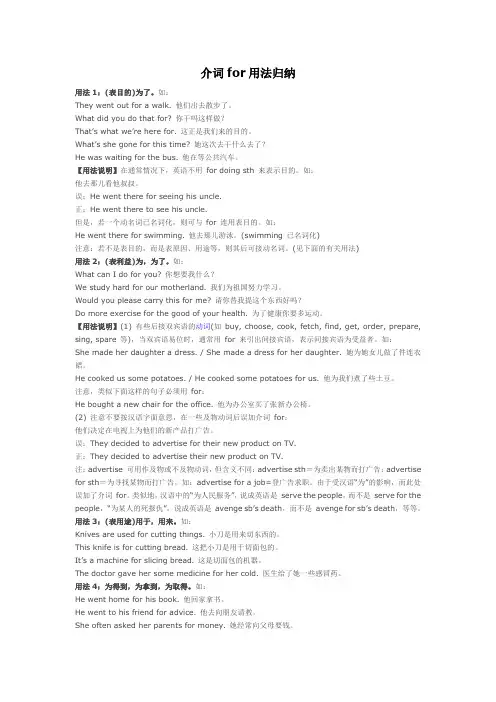
介词for用法归纳用法1:(表目的)为了。
如:They went out for a walk. 他们出去散步了。
What did you do that for? 你干吗这样做?That’s what we’re here for. 这正是我们来的目的。
What’s she gone for this time? 她这次去干什么去了?He was waiting for the bus. 他在等公共汽车。
【用法说明】在通常情况下,英语不用for doing sth 来表示目的。
如:他去那儿看他叔叔。
误:He went there for seeing his uncle.正:He went there to see his uncle.但是,若一个动名词已名词化,则可与for 连用表目的。
如:He went there for swimming. 他去那儿游泳。
(swimming 已名词化)注意:若不是表目的,而是表原因、用途等,则其后可接动名词。
(见下面的有关用法)用法2:(表利益)为,为了。
如:What can I do for you? 你想要我什么?We study hard for our motherland. 我们为祖国努力学习。
Would you please carry this for me? 请你替我提这个东西好吗?Do more exercise for the good of your health. 为了健康你要多运动。
【用法说明】(1) 有些后接双宾语的动词(如buy, choose, cook, fetch, find, get, order, prepare, sing, spare 等),当双宾语易位时,通常用for 来引出间接宾语,表示间接宾语为受益者。
如:She made her daughter a dress. / She made a dress for her daughter. 她为她女儿做了件连衣裙。

一、英语介词有哪些?英语介词有许多种,从简单到复杂总共分为四大类:简单介词 (即基本介词,如about, in, on, with等)合成介词 (如into, out of , without等)成语介词 (如according to, apart from, for the sake of等)分词介词 (如concerning, including, respecting等)二、英语介词的用法大全1)名词+介词例:It is useful to be able to predict the extent _______ which a price change will affect supply and demand.A) fromB) withC) toD) for本题考核介词和名词的搭配用法。
空格后是一个定语从句,修饰主语中的名词extent 。
空格重要求填入一个介词,与extent组成短语,修饰谓语动词affect,表示程度。
全句意思是:“能预测物价变动对供求的影响程度,会是很有用的”。
extent前要用介词to 。
From, with, 以及for 都不能与extent连用表示程度, 所以答案是C。
2)形容词 + 介词例:1997年6月四级第59题 By 1929, Mickey Mouse was as popular ________ children as Coca-Cola.A) forB) inC) toD) with本题考核形容词popular的介词搭配。
全句的意思是:“到了1929年,米老鼠和可口可乐一样,受到孩子们的欢迎。
”形容词popular后面可接介词with或among,意思是“广受欢迎的”。
因此,答案是D)with。
介词in在这类句子中可表示“受欢迎的范围”,但不能用in somebody。
to有时可以表示"对于……来说",但不能与形容词popular搭配。
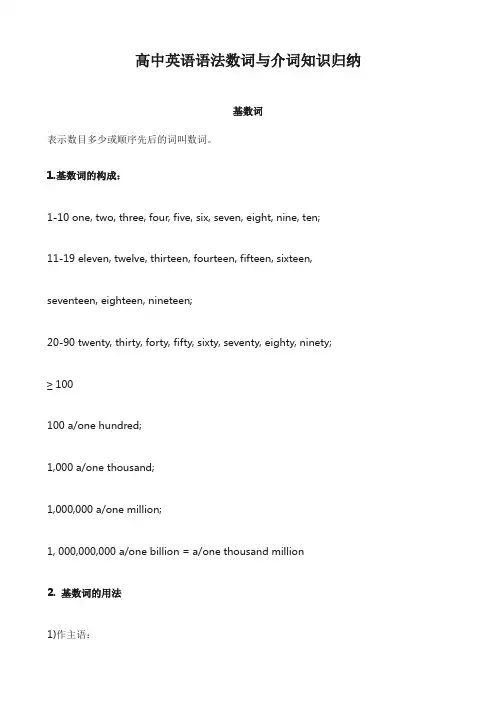
高中英语语法数词与介词知识归纳基数词表示数目多少或顺序先后的词叫数词。
1.基数词的构成:1-10 one, two, three, four, five, six, seven, eight, nine, ten;11-19 eleven, twelve, thirteen, fourteen, fifteen, sixteen, seventeen, eighteen, nineteen;20-90 twenty, thirty, forty, fifty, sixty, seventy, eighty, ninety;≥ 100100 a/one hundred;1,000 a/one thousand;1,000,000 a/one million;1, 000,000,000 a/one billion = a/one thousand million2. 基数词的用法1)作主语:Three will be enough for us.三个对我们来说就足够了。
Two of the girls are from Tokyo.这些姑娘中有两位来自东京。
2)作宾语:Four people applied for this job, but we only need one.四个人申请这工作,但我们仅需一人。
3)作表语:The population of China is over 1.3 billion.中国有十三亿多人口。
I’m twenty while my brother is sixteen.我二十岁,我弟弟十六岁。
4)作定语:We have 300 workers in our company.我们公司有三百名员工。
Forty students were involved in the interview. 四十名学生参加了这次采访。
5)作同位语:You two clean these seats.你们两个打扫这些位子。
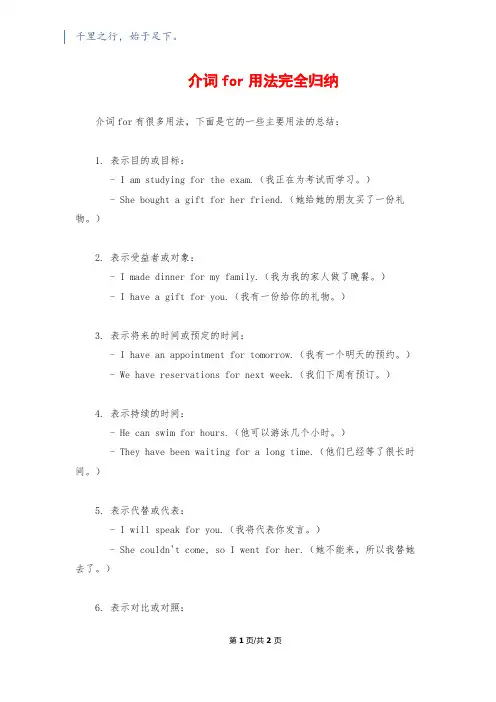
千里之行,始于足下。
介词for用法完全归纳介词for有很多用法,下面是它的一些主要用法的总结:1. 表示目的或目标:- I am studying for the exam.(我正在为考试而学习。
)- She bought a gift for her friend.(她给她的朋友买了一份礼物。
)2. 表示受益者或对象:- I made dinner for my family.(我为我的家人做了晚餐。
)- I have a gift for you.(我有一份给你的礼物。
)3. 表示将来的时间或预定的时间:- I have an appointment for tomorrow.(我有一个明天的预约。
) - We have reservations for next week.(我们下周有预订。
)4. 表示持续的时间:- He can swim for hours.(他可以游泳几个小时。
)- They have been waiting for a long time.(他们已经等了很长时间。
)5. 表示代替或代表:- I will speak for you.(我将代表你发言。
)- She couldn't come, so I went for her.(她不能来,所以我替她去了。
)6. 表示对比或对照:第1页/共2页锲而不舍,金石可镂。
- He is tall for his age.(他相对于他的年龄来说很高。
)- The weather is warm for December.(相对于十二月份来说,天气很暖和。
)7. 表示原因或理由:- I am happy for you.(我为你感到高兴。
)- She apologized for being late.(她因为迟到而道歉。
)8. 表示交换:- I traded my old car for a new one.(我用我的旧车换了一辆新车。

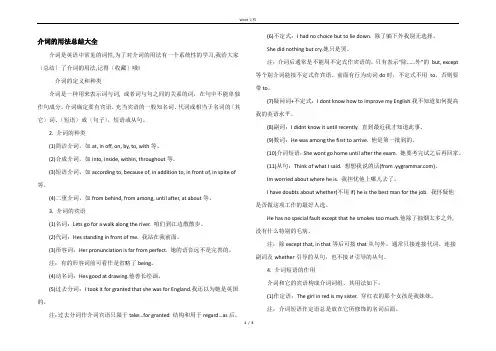
介词的用法总结大全介词是英语中常见的词性,为了对介词的用法有一个系统性的学习,我给大家〔总结〕了介词的用法,记得〔收藏〕哦!介词的定义和种类介词是一种用来表示词与词, 或者词与句之间的关系的词,在句中不能单独作句成分。
介词确定要有宾语,充当宾语的一般知名词、代词或相当于名词的〔其它〕词、〔短语〕或〔句子〕,短语或从句。
2. 介词的种类(1)简洁介词,如at, in off, on, by, to, with等。
(2)合成介词,如into, inside, within, throughout等。
(3)短语介词,如according to, because of, in addition to, in front of, in spite of 等。
(4)二重介词,如from behind, from among, until after, at about等。
3. 介词的宾语(1)名词:Lets go for a walk along the river. 咱们到江边散散步。
(2)代词:Hes standing in front of me. 我站在我前面。
(3)形容词:Her pronunciation is far from perfect. 她的语音远不是完善的。
注:有的形容词前可看作是省略了being。
(4)动名词:Hes good at drawing.他善长绘画。
(5)过去分词:I took it for granted that she was for England.我还以为她是英国的。
注:过去分词作介词宾语只限于take…for granted 结构和用于regard…as后。
(6)不定式:I had no choice but to lie down. 除了躺下外我别无选择。
She did nothing but cry.她只是哭。
注:介词后通常是不能用不定式作宾语的,只有表示“除……外”的but, except 等个别介词能接不定式作宾语。
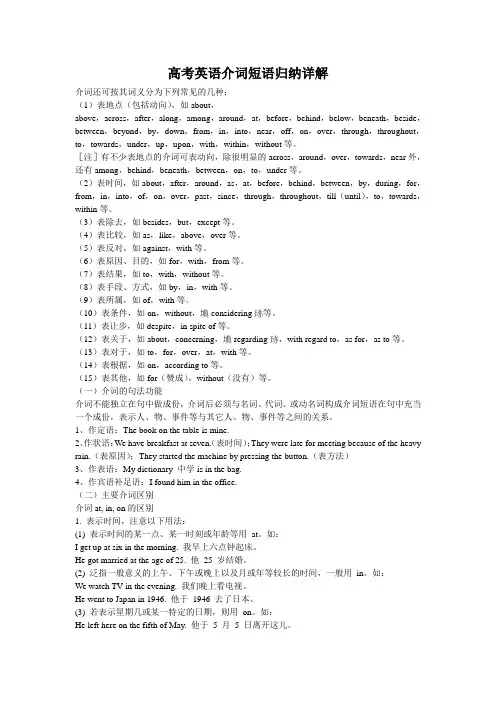
高考英语介词短语归纳详解介词还可按其词义分为下列常见的几种:(1)表地点(包括动向),如about,above,across,after,along,among,around,at,before,behind,below,beneath,beside,between,beyond,by,down,from,in,into,near,off,on,over,through,throughout,to,towards,under,up,upon,with,within,without等。
[注]有不少表地点的介词可表动向,除很明显的across,around,over,towards,near外,还有among,behind,beneath,between,on,to,under等。
(2)表时间,如about,after,around,as,at,before,behind,between,by,during,for,from,in,into,of,on,over,past,since,through,throughout,till(until),to,towards,within等。
(3)表除去,如besides,but,except等。
(4)表比较,如as,like,above,over等。
(5)表反对,如against,with等。
(6)表原因、目的,如for,with,from等。
(7)表结果,如to,with,without等。
(8)表手段、方式,如by,in,with等。
(9)表所属,如of,with等。
(10)表条件,如on,without, considering 等。
(11)表让步,如despite,in spite of等。
(12)表关于,如about,concerning, regarding ,with regard to,as for,as to等。
(13)表对于,如to,for,over,at,with等。
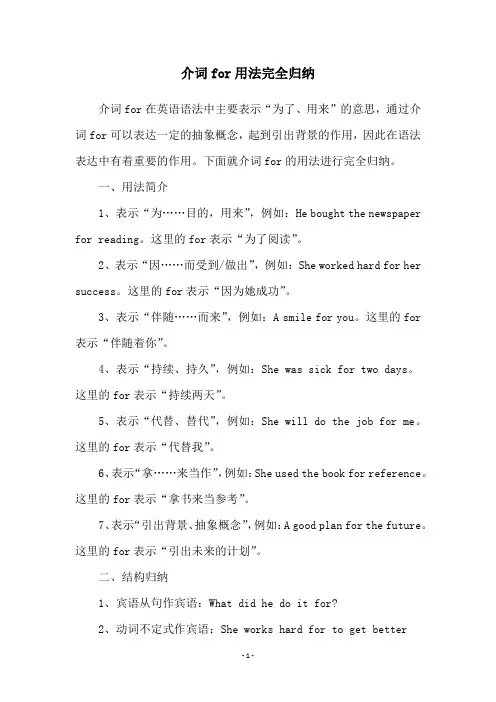
介词for用法完全归纳介词for在英语语法中主要表示“为了、用来”的意思,通过介词for可以表达一定的抽象概念,起到引出背景的作用,因此在语法表达中有着重要的作用。
下面就介词for的用法进行完全归纳。
一、用法简介1、表示“为……目的,用来”,例如:He bought the newspaper for reading。
这里的for表示“为了阅读”。
2、表示“因……而受到/做出”,例如:She worked hard for her success。
这里的for表示“因为她成功”。
3、表示“伴随……而来”,例如:A smile for you。
这里的for 表示“伴随着你”。
4、表示“持续、持久”,例如:She was sick for two days。
这里的for表示“持续两天”。
5、表示“代替、替代”,例如:She will do the job for me。
这里的for表示“代替我”。
6、表示“拿……来当作”,例如:She used the book for reference。
这里的for表示“拿书来当参考”。
7、表示“引出背景、抽象概念”,例如:A good plan for the future。
这里的for表示“引出未来的计划”。
二、结构归纳1、宾语从句作宾语:What did he do it for?2、动词不定式作宾语:She works hard for to get bettergrades.3、动词-ing形式作宾语:He bought a bicycle for riding.4、名词、代词、数词作宾语:He bought a book for English.5、名词性从句作宾语:She worked hard for what she believed.三、小结介词for在英语语法中可以表示“为了、用来”的意思,也可以表达一定的抽象概念,引出背景的作用,是文章表达更加准确的重要词语。
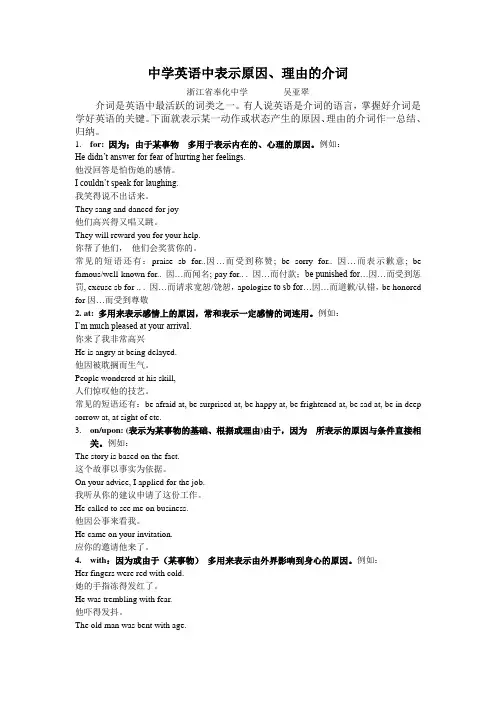
中学英语中表示原因、理由的介词浙江省奉化中学吴亚翠介词是英语中最活跃的词类之一。
有人说英语是介词的语言,掌握好介词是学好英语的关键。
下面就表示某一动作或状态产生的原因、理由的介词作一总结、归纳。
1.for: 因为;由于某事物多用于表示内在的、心理的原因。
例如:He didn’t answer for fear of hurting her feelings.他没回答是怕伤她的感情。
I couldn’t speak for laughing.我笑得说不出话来。
They sang and danced for joy他们高兴得又唱又跳。
They will reward you for your help.你帮了他们,他们会奖赏你的。
常见的短语还有:praise sb for..因…而受到称赞; be sorry for.. 因…而表示歉意; be famous/well-known for.. 因…而闻名; pay for.. . 因…而付款;be punished for…因…而受到惩罚, excuse sb for .. . 因…而请求宽恕/饶恕,apologize to sb for…因…而道歉/认错,be honored for因…而受到尊敬2. at: 多用来表示感情上的原因,常和表示一定感情的词连用。
例如:I’m much pleased at your arrival.你来了我非常高兴He is angry at being delayed.他因被耽搁而生气。
People wondered at his skill,人们惊叹他的技艺。
常见的短语还有:be afraid at, be surprised at, be happy at, be frightened at, be sad at, be in deep sorrow at, at sight of etc.3.on/upon: (表示为某事物的基础、根据或理由)由于,因为所表示的原因与条件直接相关。
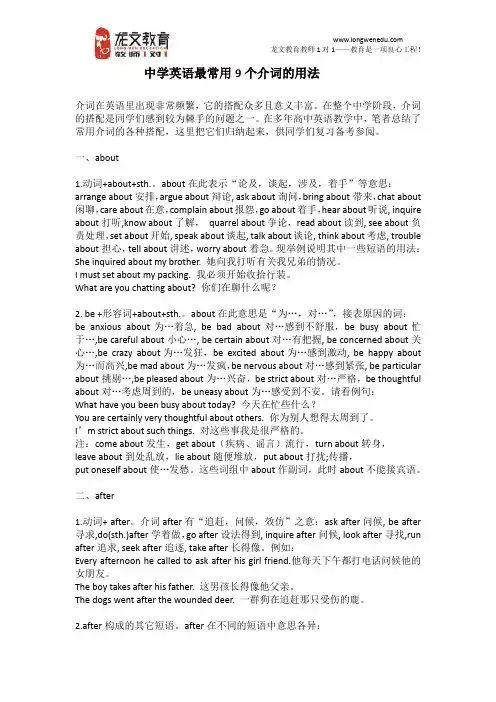
中学英语最常用9个介词的用法介词在英语里出现非常频繁,它的搭配众多且意义丰富。
在整个中学阶段,介词的搭配是同学们感到较为棘手的问题之一。
在多年高中英语教学中,笔者总结了常用介词的各种搭配,这里把它们归纳起来,供同学们复习备考参阅。
一、about1.动词+about+sth.。
about在此表示“论及,谈起,涉及,着手”等意思:arrange about安排,argue about辩论, ask about询问,bring about带来,chat about 闲聊,care about在意,complain about报怨,go about着手,hear about听说, inquire about打听,know about了解,quarrel about争论,read about读到, see about负责处理,set about开始, speak about谈起, talk about谈论, think about考虑, trouble about担心,tell about讲述,worry about着急。
现举例说明其中一些短语的用法:She inquired about my brother. 她向我打听有关我兄弟的情况。
I must set about my packing. 我必须开始收拾行装。
What are you chatting about? 你们在聊什么呢?2. be +形容词+about+sth.。
about在此意思是“为…,对…”,接表原因的词:be anxious about为…着急, be bad about对…感到不舒服,be busy about忙于…,be careful about小心…, be certain about对…有把握, be concerned about关心…,be crazy about为…发狂,be excited about为…感到激动, be happy about 为…而高兴,be mad about为…发疯,be nervous about对…感到紧张, be particular about挑剔…,be pleased about为…兴奋,be strict about对…严格,be thoughtful about对…考虑周到的,be uneasy about为…感受到不安。
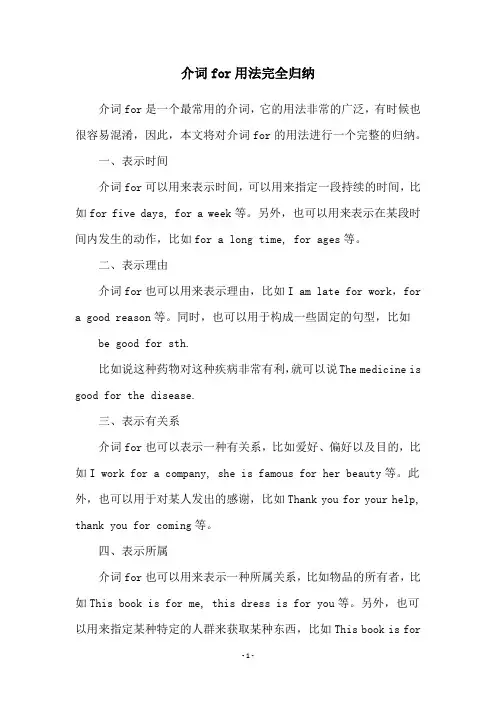
介词for用法完全归纳介词for是一个最常用的介词,它的用法非常的广泛,有时候也很容易混淆,因此,本文将对介词for的用法进行一个完整的归纳。
一、表示时间介词for可以用来表示时间,可以用来指定一段持续的时间,比如for five days, for a week等。
另外,也可以用来表示在某段时间内发生的动作,比如for a long time, for ages等。
二、表示理由介词for也可以用来表示理由,比如I am late for work,for a good reason等。
同时,也可以用于构成一些固定的句型,比如be good for sth.比如说这种药物对这种疾病非常有利,就可以说The medicine is good for the disease.三、表示有关系介词for也可以表示一种有关系,比如爱好、偏好以及目的,比如I work for a company, she is famous for her beauty等。
此外,也可以用于对某人发出的感谢,比如Thank you for your help, thank you for coming等。
四、表示所属介词for也可以用来表示一种所属关系,比如物品的所有者,比如This book is for me, this dress is for you等。
另外,也可以用来指定某种特定的人群来获取某种东西,比如This book is forchildren, these toys are for students等。
以上是介词for的用法完全归纳,简而言之,介词for的用法可以划分为表示时间、表示理由、表示有关系和表示所属四种情况。
它们可以在任何时候、任何地方使用,更多的用法要根据实际情况灵活运用。
1. 介词for的用法原发布者:寥若星辰99介词for的常见用法归纳贵州省黔东南州黎平县黎平一中英语组廖钟雁介词for用法灵活并且搭配能力很强,是一个使用频率非常高的词,也是高考必考的重要词汇,现将其常见用法归纳如下,供参考。
1.表时间、距离或数量等。
①意为“在特定时间,定于,安排在约定时间”。
如:Themeetingisarrangedfor9o'clock.会议安排在九点进行。
②意为“持续达”,常于last、stay、wait等持续性动词连用,表动作持续的时间,有时可以省略。
如:Hestayedforalongtime.他逗留了很久。
Themeetinglasted(for)threehours.会议持续了三小时。
③意为“(距离或数量)计、达”。
例如:Hewalkedfortwomiles.他走了两英里。
Theshopsentmeabillfor$100.商店给我送来了100美元的账单。
2.表方向。
意为“向、朝、开往、前往”。
常与head、leave、setoff、start等动词连用。
如:TomorrowTomwillleaveforBeijing.明天汤姆要去北京。
Heputonhiscoatandheadedforthedoor他穿上大衣向门口走去。
介词to也可表示方向,但往往与come、drive、fly、get、go、lead、march、move、return、ride、travel、walk等动词连用。
3.表示理由或原因,意为“因为、由于”。
常与thank、famous、reason、sake等词连用。
如:ThankyouforhelpingmewithmyEnglish.谢谢你帮我学习英语。
Forseveralreasons,I'drathernotmeethim.由于种种原因,我宁可不见他。
TheWestLa2. 介词短语做定语和状语的区别(分析一些for的句子)介词短语作状语A)介词短语作状语,用来修饰动词。
英语介词for的用法归纳总结(2)用法8:(介词for表时间、距离、数量等)达,计I’m going away for a few days. 我要走开几天。
I’ve been here for ten years. 我来这儿有10年了。
He walked for ten miles. 他走了10英里路。
The shop sent me a bill for $50. 商店给我送来了一张50美元的账单。
【用法说明】for 用于表示时间或距离的长度(尤其是紧跟在动词之后)时,有时可省略The meeting lasted (for) three days. 会议持续了3天。
They walked (for) fifty miles. 他们走了50英里。
但是当 for 短语位于句首或在否定句中时, for 通常不宜省去For ten years he lived here. 他在这里住过10年。
We have not heard from him for a long time. 我们很久没收到他的来信了。
用法9:介词for表对,对于Eggs are good for you. 鸡蛋对你有好处。
Reading in bed is bad for your eyes. 躺在床上看书对你的眼睛不好。
Fortunately for me, the train was also late. 我很走运,火车也晚点了。
【用法说明】关于for 与to 表示“对……来说”时的区别,参见to。
用法10:(介词for表适合)适于,适合Do you have any books for children? 你有适合小孩子看的书吗?He is the very person for the work. 他是最适合做这工作的人。
It’s a good place for a camp. 那是个露营的好地方。
She bought some clothes for winter. 她买了些冬天穿的衣服。
初中英语常用固定搭配及介词用法归纳总结agree with①同意;赞同:I quite agree with him on the sports. 我非常同意他在运动方面的观点。
②与…相符;与…一致:His words do not agree with his actions. 他言行不一致。
③[常用于否定句] (食物等) 适合:Too much meat doesn’t agree with her. 她不宜吃太多肉。
hold on①抓着…不放;坚持:She held on to me tightly. 她紧紧地抓住我。
I will hold on to my dream and never give it up.我要坚持自己的梦想,永不放弃。
② [电话用语] 别挂断;等一下:Can you hold on? I’ll see if the manager’s in the office. 先别挂电话行吗?我去看看经理在不在办公室。
make up①[不用于进行时] 组成;构成:In some languages, 100 words make up half of all words used in daily conversations. 在一些语言中,100个词就构成了一半的日常会话用语。
②编写;编造:At your first meeting you should make up a rule book. 在第一次会议上,你要编写出一个规章手册。
③为…化妆:They made him up as an old man for the last act of the play. 在演这出戏的最后一幕时,他们把他打扮成一个老头。
pick up①拿起;拾起:The phone rang and I picked it up. 电话响了,我接了起来。
I picked up the rubbish and threw it into the trash can. 我把垃圾拾起来,扔进垃圾桶。
常用介词及副词的搭配用法归纳(-)aboutabout既可以用作介词也可以用作副词,它常和下列名词,动词,形容词搭配使用。
名词+abouttalk about 关于谈话;information about/on 关于知识,消息动词+aboutthink about sth. 考虑某事考虑某事look about 环顾;考虑bring about 带来,造成,引起leave about 乱放come about 发生go about 四处走动get about 走动,传开,着手干set about 开始,着手hang about 逗留,徘徊put about 传播谣言turn about 回首,转身,轮流tell sb.about sth. 告诉某人某事告诉某人某事grief about sth. 对…伤心confuse sb.about sth 使某人使某人对某事感到混乱bother sb.about sth 为某事打扰某人为某事打扰某人gossip about sb.or sth.谈论、闲聊某人或某事形容词+abouthopeful about/of 希望,期待particular about 对…讲究,特别enthusiastic about 对…热心crazy about ab./sth. 对…欣喜sure about/of 对..确定知道,对…有把握anxious about 对…担忧,焦虑anxious for 渴望careful about/of 注意,保护,保重careful with 对…注意,照顾careless about 对…不留心feel nervous about/at sth. 对…感到不安doubtful about/of 对…感到好奇optimistic about 对…感到乐观happy about/at sth. 因某事而感到高兴因某事而感到高兴(二)acrossacross 既可以用作介词也可以用作副词,它常与下列动词搭配使用。
千里之行,始于足下。
for的用法完全归纳for是一个非常常用的介词,在英语中有多种用法。
下面是对for用法的完整归纳:一、表示目的或目标:1. I bought this book for studying English.(我买了这本书是为了学习英语。
)2. He went to the supermarket for buying some groceries.(他去超市买些杂货。
)3. We are here for discussing the project.(我们是来讨论项目的。
)二、表示持续时间:1. I have been waiting for you for two hours.(我已经等了你两个小时了。
)2. She will be away for a week.(她将离开一周。
)3. They have been married for ten years.(他们已经结婚十年了。
)三、表示对待或对付:1. She is very kind for a boss.(她作为老板对待人很亲切。
)2. He was harsh for a teacher.(他作为一名老师对待学生很严厉。
)3. This medicine is for headaches.(这药治疗头疼。
)四、表示代替:1. I can drive for you.(我可以代替你开车。
)2. She will work for me while I'm on vacation.(我休假期间她会替我工作。
)第1页/共3页锲而不舍,金石可镂。
3. He is standing in for the injured player.(他代替受伤的球员站在场上。
)五、表示交换或交易:1. I'll give you my pen for your notebook.(我用我的钢笔交换你的笔记本。
)2. She traded her old car for a new one.(她以旧车换新车。
for 介词用法for 是一个英语介词,用于表示原因、目的或距离。
以下是它的常见用法:1.表示原因:例如,"I'm sorry for what I said to you."(我对我对你说的话感到抱歉。
)2.表示目的:例如,"I'm saving money for a new car."(我正在存钱买一辆新车。
)3.表示距离、时间或数量:例如,"I walked for miles."(我走了好几英里。
)"I waited for hours."(我等了好几个小时。
)"I paid $100 for the book."(我为这本书付了100美元。
)4.与动词连用,表示目的或结果:例如,"He searched for the answer."(他寻找答案。
)"The company was founded for the purpose of innovation."(这家公司是为了创新而成立的。
)5.与动词连用,表示原因:例如,"She jumped for joy."(她高兴得跳了起来。
)6.表示接受的对象:例如,"Who will represent us at the meeting?" "For me,a volunteer would be fine."(谁将代表我们参加会议?“对我来说,一个志愿者就行。
”)7.表示时间长度:例如,"We will stay for a week."(我们将待一个星期。
)8.表示“赞成、支持”:例如,"Are you for or against the plan?"(你是支持还是反对这个计划?)9.与动词连用,表示“适合”:例如,"This is not good enough for the occasion."(这个场合不太适合。
用法1:(表目的)为了。
如:
They went out for a walk. 他们出去散步了。
What did you do that for? 你干吗这样做?
That’s what we’re here for. 这正是我们来的目的。
What’s she gone for this time? 她这次去干什么去了?
He was waiting for the bus. 他在等公共汽车。
【用法说明】在通常情况下,英语不用for doing sth 来表示目的。
如:他去那儿看他叔叔。
误:He went there for seeing his uncle.
正:He went there to see his uncle.
但是,若一个动名词已名词化,则可与for 连用表目的。
如:
He went there for swimming. 他去那儿游泳。
(swimming 已名词化) 注意:若不是表目的,而是表原因、用途等,则其后可接动名词。
(见下面的有关用法)
用法2:(表利益)为,为了。
如:
What can I do for you? 你想要我什么?
We study hard for our motherland. 我们为祖国努力学习。
Would you please carry this for me? 请你替我提这个东西好吗?
Do more exercise for the good of your health. 为了健康你要多运动。
【用法说明】(1) 有些后接双宾语的动词(如buy, choose, cook, fetch, find, get, order, prepare, sing, spare 等),当双宾语易位时,通常用for 来引出间接宾语,表示间接宾语为受益者。
如:。